
34% Indians want to switch jobs, 81% feel remote work feasible: PwC survey

Around 81% of Indian employees believe that their jobs can be done remotely and 31% of those who can work remotely are already working in a hybrid way, according to PwC’s India Workforce Hopes and Fears Survey 2022.
“The past couple of years have brought about a significant change in the workplace with the changing dynamics between the employee and employer. There has been a shift in mindset on both sides of the table. Employers are more focused on building a resilient workforce strategy that balances alignment to act with speed and adaptability to position for scale. Employees, on their part, place a premium on organisational trust, innovation and hybrid ways of working,” the PwC survey report said.
Also read: Microsoft cuts 1% workforce amid recession fears; Google goes slow
Career pathways
An important finding from the survey is that a significantly higher proportion of Indian employees (71%) are concerned about being overlooked for career advancement compared to their global peers (21%). This points to the need for deploying more transparent and data-driven processes to define career pathways, it added.
“The disruptive landscape of social, environmental, economic and geopolitical changes has had profound consequences on organisations and their workforce strategies. Leaders need to consider these disruptions while drawing up their short- and long-term plans.”
– Chaitali Mukherjee, Partner and Leader, People and Organisation, PwC India
The survey covered 2,608 participants from India, and 93% of them were full-time employees. Of the total number of employees surveyed, 78% were men, 16% were women and 5% were others, while 1% did not answer the question on gender.
How important are the following factors to you when considering making a change in your work environment?
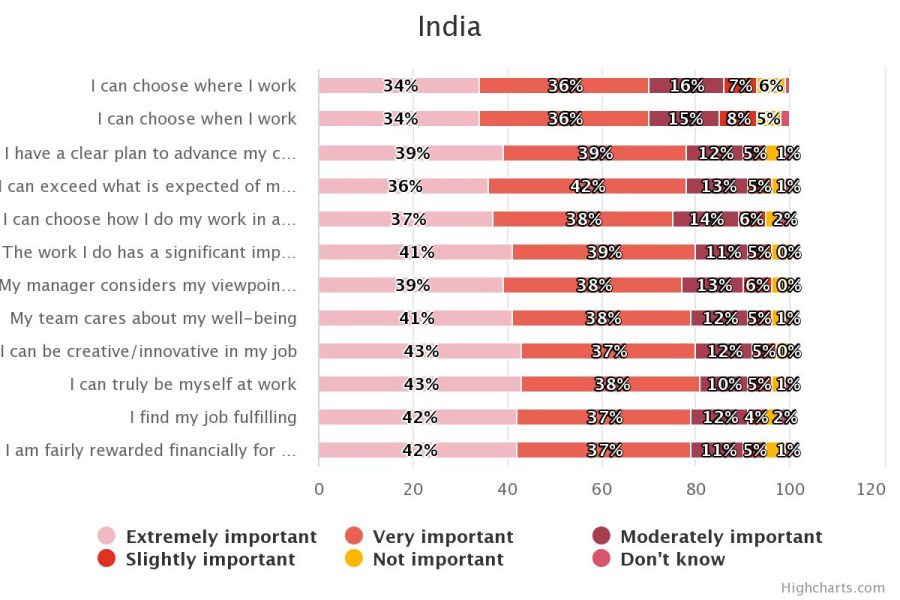
Of the survey participants, 85% were employed in professional or administrative jobs, 10% did skilled manual work, and the remaining 5% did semi-skilled or unskilled manual work. The survey covered people across generations: 54% of those surveyed were millennials (26–41 years), 26% were Gen X (42–57 years), 15% were Gen Z (18–25 years of age) and 5% were baby boomers (58–76 years).
Also read: NITI Aayog: India’s gig workforce could grow to 2.35 crore
The findings revealed that beyond financial reward, employees are driven by the opportunity for fulfilment, creativity and innovation, and being one’s true self at work.
How likely are you to take the following actions with your employer within the next 12 months? (showing only ‘extremely likely’ and ‘very likely’ responses)
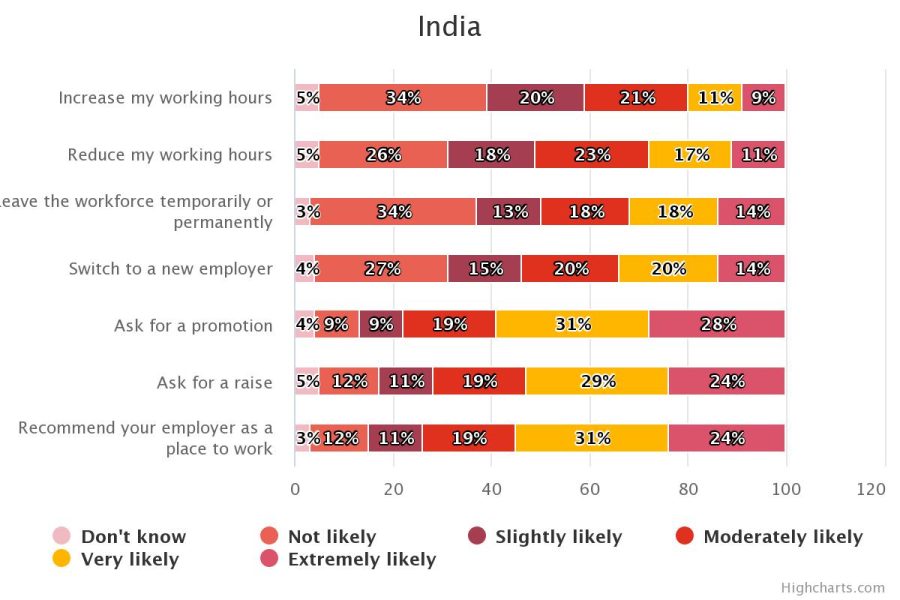
The survey found that 34% of respondents in India believe they are extremely/very likely to switch to a new employer as compared to 19% globally.
Further, 32% said they plan to leave the workforce. Millennials are the most likely to seek new employment, with 37% indicating that they are likely to switch employers in the next 12 months. While Gen Z employees are less likely to quit, 33% of them are extremely or very likely to ask for a reduction in work hours.
Also, more than half of the respondents in the survey were concerned about the lack of opportunities to work with or learn technological skills from their colleagues. This learning gap begins at the top, with more than 50% of CEOs perceiving a lack of opportunities for learning technological skills.
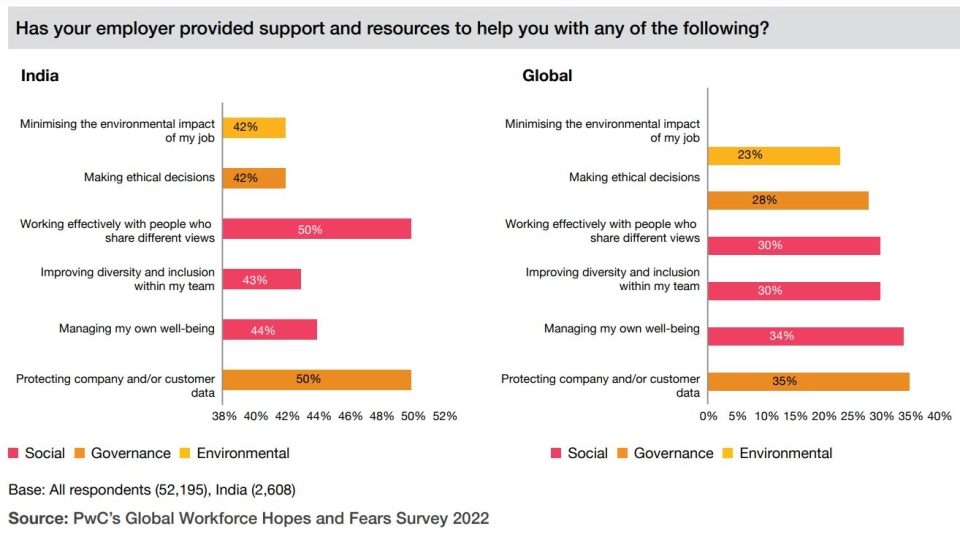
Sensitive social and political topics are occupying an increasingly important place in workplace conversations, with 75% of employees having had conversations of this nature, highlighting the need for employers to actively create safe spaces for such conversations, the survey’s findings said.
Also read: The swing is back: 50% workforce to look for new jobs, says study
Gap in skillsets
The survey also highlighted that employees expect more transparency and support in incorporating environmental, social and governance (ESG) considerations into their work.
India is one of the countries with a huge perceived gap in skills, with 54% of employees strongly/gap in skills, with 54% of employees strongly/ moderately agreeing that India faces a shortage of their skill sets and 67% believing that their job requires specialist training. At present, employers are seen as addressing skill shortages through wage increases, recruitment and automation, with fewer using upskilling as a strategic lever, the report said.
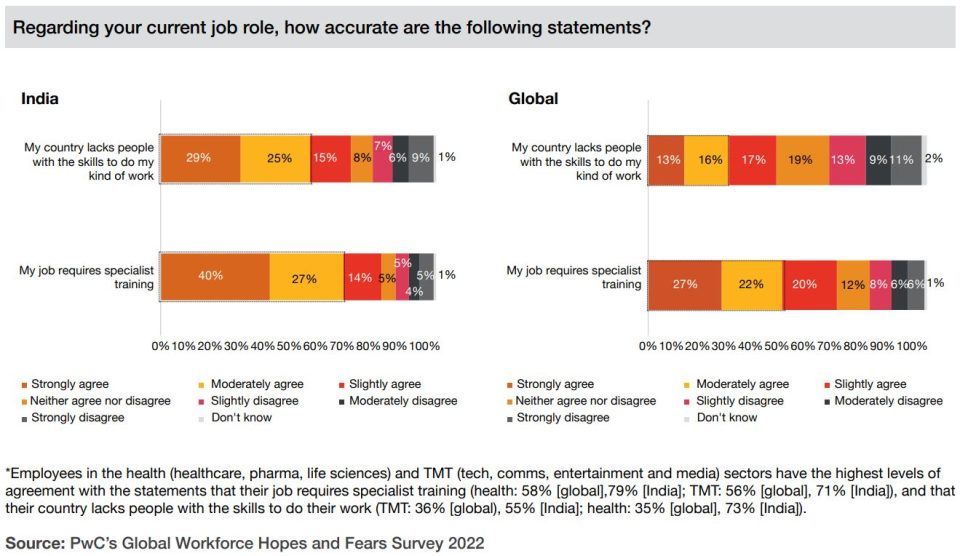
Around 51% of the employees in India stated that their employer is not imparting relevant technical or digital skills training needed for their career as compared to 39% globally.
Promotion and pay hike
Retention risk is likely to continue as employees are seeking tangible outcomes from organisations in the near future: 59% of Indian employees (as compared to 30% globally) are likely to ask for a promotion and 53% for a raise in the next 12 months. More employees in India are likely to ask for a raise or promotion in the next 12 months, with millennials expressing the highest inclination to do so.
In India, a far greater proportion of respondents aspire for a promotion in the coming year — 59% of respondents from India say they are extremely/very likely to ask for a promotion in the next 12 months as compared to 30% globally. Similarly, a higher percentage of respondents say they plan to ask for a raise — 53% respondents from India say they are extremely/very likely to ask for a raise in the next 12 months as compared to 35% globally, as per the survey.
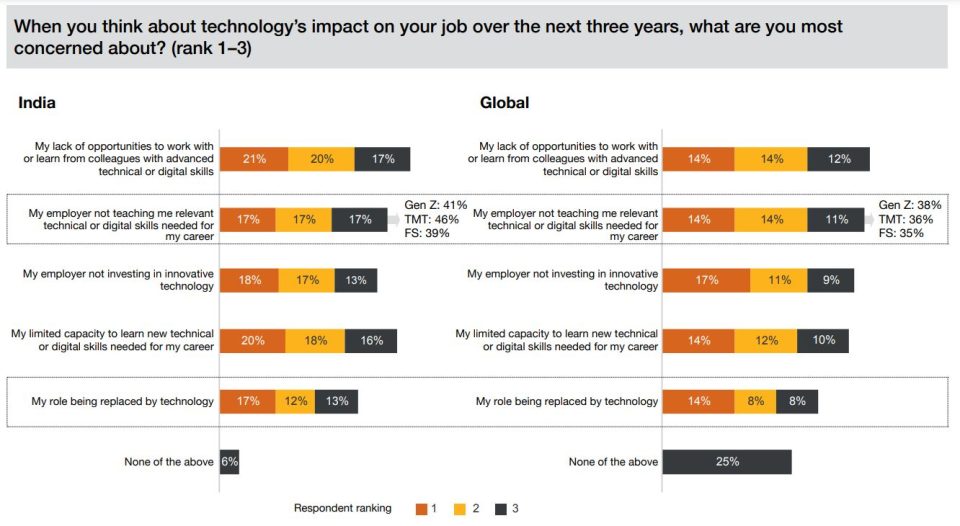
Chaitali Mukherjee, Partner and Leader, People and Organisation, PwC India said: “The disruptive landscape of social, environmental, economic and geopolitical changes has had profound consequences on organisations and their workforce strategies. Leaders need to consider these disruptions while drawing up their short- and long-term plans for the organisation as well as their people.
“The themes emerging from our survey throw light on how organisational strategy is experienced at the grassroots level. For an organisation to be fit for future, it is imperative that employee perspective dovetails with the employer’s perspective to accelerate transformation keeping in mind the workforce dynamics, with well-defined tangible measures to bring about greater alignment between both these aspects.”


